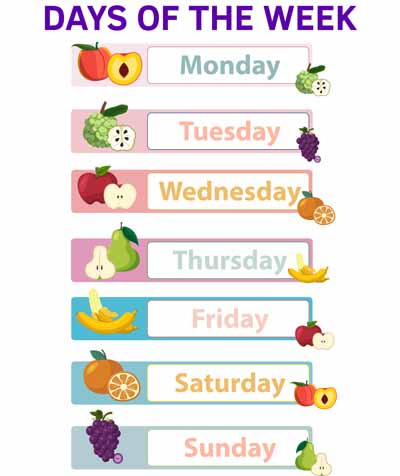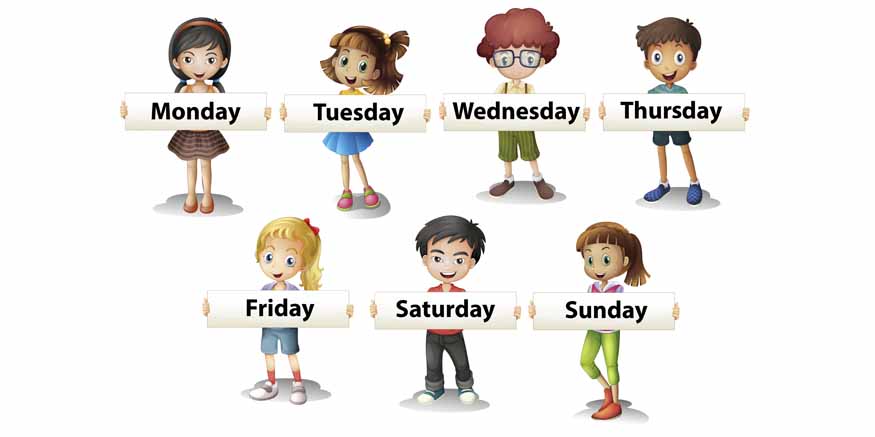Understanding the days of the week is a fundamental concept that sets the stage for kids’ time management skills and structured routines. It introduces children to the basic idea of sequencing and helps them plan their days efficiently. We can all turn it into a fun, interactive, and memorable experience that will ensure kids effortlessly grasp the idea of all days of the week while enjoying the learning process.
Introducing the days of the week for kids at an early age helps enhance cognitive development. It strengthens memory, sequencing abilities, and logical thinking. Associating specific activities or events with certain days makes the concept relatable and easy to remember. For example, linking Friday with a favourite family outing helps children anchor that day in their minds.
Fun Activities to Teach Days of the Week

- Songs and Rhymes
- Story-Based Learning
- Hands-On Crafts
- Role-Playing and Game-Based Learning
- Leveraging Technology in Learning
- Cultural and Personal Relevance
Music is an effective tool for teaching young learners. Many catchy songs and rhymes about the seven days of the week are specifically designed to help children remember the order of the days. Singing along not only makes learning fun but also improves recall.
Adding actions or dance moves to the songs further engages kids. For example, clapping on specific days or jumping during the weekend adds a physical dimension to the learning process.
Storytelling is another creative way to teach the days of the week to kids. Crafting stories where each day features an exciting event or adventure helps children relate to and remember the days. For example, you could narrate a story where Monday is the day for superhero school and Saturday is dedicated to a treasure hunt.
Creative activities like designing a personal “Days Journal” can be a fun way to teach all days of the week. Kids can draw or paste pictures representing each day, helping them associate the names with specific events.
Role-playing games provide an engaging way for children to act out activities associated with the seven days of the week. For example, you can create scenarios where one child pretends to be Monday by preparing for school, while another embodies Saturday by hosting a fun picnic. These imaginative games enhance retention through active participation.
Other fun games include “Day Detective,” where children find clues related to each day hidden around the room. These games encourage teamwork and problem-solving while reinforcing the concept of all days of the week.
In today’s digital age, technology offers numerous tools for teaching the days of the week for kids. Educational apps and online games provide interactive experiences tailored for young learners. Activities like matching days to events, completing puzzles, or singing along to animated songs make learning engaging and fun.
Parents and teachers can also use virtual tools like digital calendars to introduce the concept of the seven days of the week. Setting reminders for specific tasks on certain days allows kids to experience the practical application of what they’ve learned.
Incorporating cultural and personal significance into the learning process can make the days of the week activities more meaningful for children. For instance, if a family tradition involves Sunday outings or Friday prayers, explaining the importance of these days helps anchor them in the child’s mind.
Parents can share their weekly schedules with children and encourage them to identify what happens on specific days. This practice not only reinforces the names of the days but also fosters a deeper connection between the learning material and real-life experiences.
Challenges and Tips for Overcoming Them
Teaching the seven days of the week can sometimes be challenging, especially if children struggle with retention or lose interest. To overcome these obstacles, it is important to adopt a blended approach that combines multiple methods. Use visual aids like a days-of-the-week creative chart, incorporate fun games, and repeat the material through songs and stories.
Consistency and repetition are crucial. Reviewing the days of the week for kids daily in different formats ensures that the concept is reinforced without becoming monotonous. Encourage questions and adapt your teaching style to match the child’s interests and learning preferences.
Teaching the days of the week for kids can be a rewarding experience when approached creatively. By integrating tools like a days-of-the-week creative chart, storytelling, songs, and role-playing games, you can make the process both effective and enjoyable. Consistent practice and engagement ensure that children develop a strong understanding of all days of the week.

At Mother’s Pet Kindergarten, we believe in going beyond traditional teaching methods. Our curriculum is designed to combine interactive activities, music, and creative tools like charts to make learning the seven days of the week a joyful experience. We emphasise personalised attention to ensure each child grasps the concept at their own pace. With the right blend of fun and education, teaching the days of the week for kids becomes not just a learning journey but a delightful adventure.













Recent Comments